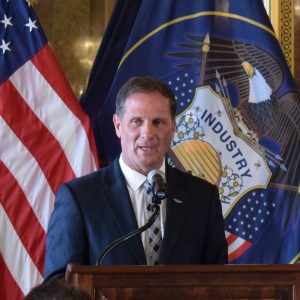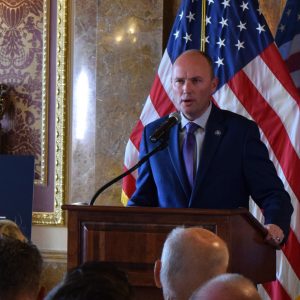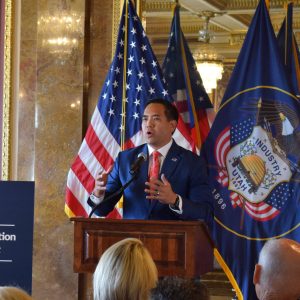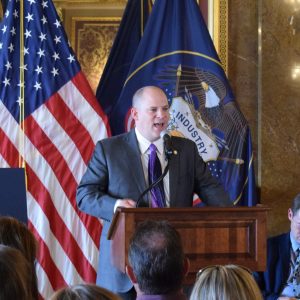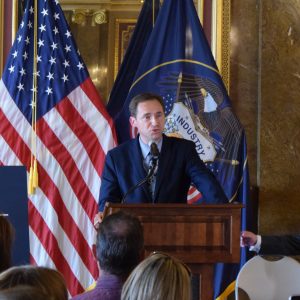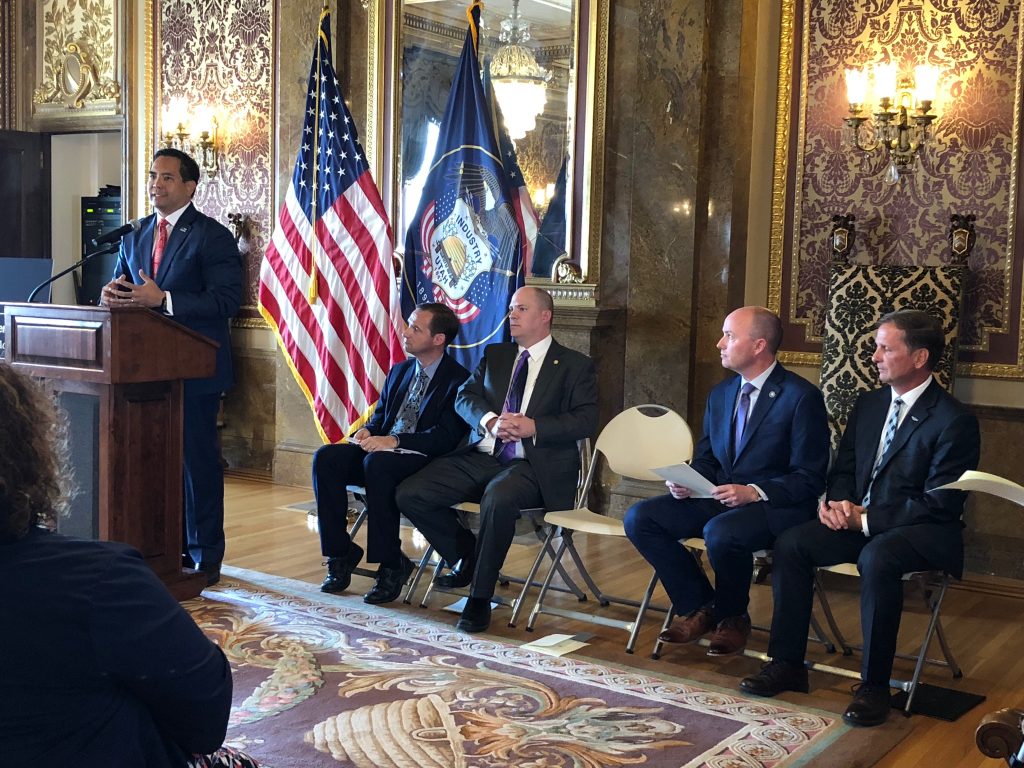Posts Tagged ‘suicide hotline’
FCC Unanimously Designates 988 as New Three-Digit Suicide Hotline
June 16, 2020
Today, the Federal Communications Commission (FCC) voted unanimously to designate 988 as the new three-digit suicide hotline.
Currently, callers can reach the hotline at 1-800-273-8255 (TALK). With the FCC’s ruling, service providers will have a two-year transition period, with implementation of the three-digit hotline to be finalized by July 16, 2022. During this transition, all crisis calls to the hotline should continue to be directed to the current, 10-digit number. After the transition is completed, callers will still be able to reach the hotline by calling the 10-digit number.
The designation of the three-digit hotline comes at a time when it is needed most. Suicide is the 10th leading cause of death in the United States, according to the Centers for Disease Control and Prevention. In Utah, suicide is the 7th leading cause of death, putting Utah with the 6th highest rate of suicide in the nation.
The idea for a three-digit suicide prevention hotline was first conceived right here in Utah. Utah Senator Dan Thatcher first proposed the idea for a three-digit suicide prevention line in 2012, but it didn’t gain traction in the Legislature at that time. Senator Thatcher partnered with the Utah Attorney General Sean D. Reyes, Wade Farraway, Missy Larsen, and others at the Utah Attorney General’s Office in 2014. The group started the SafeUT app as a way to reach Utahns in crisis while still campaigning for the three-digit number. In 2017, the group enlisted the help of Rep. Chris Stewart and Sen. Orrin Hatch, who presented the idea on the federal level. This has led to the designation of the three-digit number 988.
We are grateful for our partners for working diligently with the Utah Attorney General’s Office to get a three-digit crisis line off the ground and to the FCC for prioritizing suicide prevention.
If you or someone you know is struggling and/or having thoughts of suicide, please reach out. Call the National Suicide Prevention Lifeline at 1-800-273-TALK (8255), text the Crisis Text Line (text HELLO to 741741), or message a trained crisis counselor through the SafeUT app. These support lines are available 24/7, 365 days a year.
Read the FCC’s press release here.
FCC Votes to Proceed Designation of 988 as New Suicide Prevention Hotline Number
December 13, 2019
Yesterday, the Federal Communications Commission (FCC) voted to proceed with the process of designating 988 as the new, nationwide, 3-digit number dedicated as a suicide prevention and mental health crisis line. This number will replace the current, 12-digit number 1-800-273-8255.
“This designation will help ease access to crisis services, reduce the stigma surrounding suicide and mental health condition, and ultimately save lives,” the FCC said in a release Thursday.
This decision follows a report the FCC’s Wireline Competition Bureau and Office of Economics and Analytics sent to Congress in August recommending a 3-digit dialing code as the crisis hotline. The report noted a more than 20% increase in suicides in over most of the nation from 1999 to 2019. It also noted increasing suicide rates in Veterans and the LGBTQ community.
“This is 911 for mental and behavioral crises. And this emergency number started right here in Utah, with amazing partners like Senator Daniel Thatcher and this office demanding more be done to address the alarming suicide rates in this nation,” said Utah Attorney General Sean D. Reyes.
“We couldn’t get it passed at the state level, so we pushed to the federal level. Senator Hatch and Congressman Stewart were our champions. It’s amazing to finally see it come to fruition. It is one of the achievements in public service of which I am most proud.
“A simplified three-digit suicide and mental and behavioral health hotline will make a huge difference when it comes to intervention and prevention. It will save lives! No doubt,” Attorney General Reyes added.
All telecommunication carriers and interconnected Voice over Internet Protocol service providers must implement the 988 number within the next 18 months.
The Commission will begin taking public comment on the Notice of Proposed Rulemaking following publication in the Federal Register. Following review of that public record, the Commission will move toward final rules.
The change to the 988 hotline will not be implemented for several months. If you or someone you know is struggling with mental health or contemplating suicide, please use the SafeUT app to speak with a crisis counselor for free or call 1-800-273-8255 (TALK).
FCC Recommends Three-Digit Crisis Hotline
August 16, 2019
Following five and a half years of hard work and perseverance by the Utah Attorney General’s Office and Utah state and federal legislators, the Federal Communications Commission (FCC) plans to move forward with changing the ten-digit national suicide hotline to a three-digit number – 988. The hotline will also be available to those who are struggling with mental health crises of any kind.
Yesterday afternoon, the Federal Communications Commission’s Wireline Competition Bureau and Office of Economics and Analytics announced that they sent a report to Congress which recommends that the Commission consider designating 988 as a replacement to the current number, 1-800-273-8255.
This follows the 2018 report on the National Suicide Hotline Improvement Act of 2018 which recommended that a three-digit number should be used for the crisis hotline. Suicide and mental health numbers have increased over the years, causing an influx of callers to the National Suicide Prevention Lifeline. According to the FCC, 2.2 million people called the hotline in 2018.
“Our team found that a 3-digit number would make it easier for Americans in crisis to reach someone who could help,” Ajit Pai, the FCC’s chairman, said in an email statement on Thursday night. “If we can stand up ‘988’ nationwide as a way to access suicide prevention services, we believe it could save lives. I’ll do everything I can to move this forward.”
Utah Senator Dan Thatcher first conceived the idea for a three-digit suicide prevention line in 2012, but it didn’t gain traction in the Legislature at that time. Senator Thatcher partnered with the Utah Attorney General Sean D. Reyes, Wade Farraway, Missy Larsen, and others at the Utah Attorney General’s Office in 2014. The group started the SafeUT app as a way to reach Utahns in crisis while still campaigning for the three-digit number. In 2017, the group enlisted the help of Rep. Chris Stewart and Sen. Orrin Hatch, who presented the idea on the federal level. This has led to the recommendation of the three-digit number 988.
The change has not yet been implemented and will have a months-long process. If you or someone you know is struggling with mental health or contemplating suicide, please use the SafeUT app to speak with a crisis counselor for free or call 1-800-273-8255 (TALK).
Three-digit crisis line on the horizon
At the Utah State Capitol, yesterday, U.S. Representative Chris Stewart hosted a celebration of The National Suicide Prevention Hotline Improvement Act which was signed into law last week. The Trib headline was perfect: Amid tears for the lost, Utah leaders celebrate new law to help create a new national suicide hotline. You can read the article here.
Related – Deseret News: A three-digit suicide crisis line could launch next year
This was an emotional event. Rep. Stewart kicked it off by taking a moment to remember those lives that were lost and applauded all who have worked to make a three-digit crisis line a reality.
A Utah idea intended to help 3 million people will now impact the lives of over 300 million Americans of all ages.
Listen in here.
Utah Attorney General Sean Reyes spoke about why the passage of this act is a game-changer for Utah teens, veterans, and how everyone across the nation will now benefit from it. If you haven’t read AG Reyes’ op-ed on the topic, here’s a link.
For those who came in late, the three-digit suicide hotline was the subject of a bill by Utah Senator Daniel Thatcher over 4 years ago. That idea met unexpected political opposition locally, but morphed into the creation of the SafeUT Commission and eventually the popular, effective SafeUT app.
At the same time, U.S. Representative Chris Stewart and U.S. Senator Orrin took Senator Thatchers original idea back to Washington, D.C. and the rest is history.
Thank you for paying attention, and thank you for all you do to guard and protect those around you.
You can watch the entire conference below.
Last but not least – thanks, Senator Hatch, for your support from afar!
Sen Hatch was unable to be in Utah today to join those celebrating the Suicide Hotline bill becoming law, but he spoke on the floor and thanked those back home that helped along the way, including @RepChrisStewart @SenThatcher @repsteveeliason @SpencerJCox @SeanReyesUT. #utpol pic.twitter.com/zuGkBN20SS
— Senator Hatch Office (@senorrinhatch) August 21, 2018
Op-ed: Three-digit suicide lifeline is a huge victory for Utah
In an op-ed published in the Deseret News on July 27th, Attorney General Sean Reyes shares the history of the three-digit number for mental and behavioral crises. A journey which started with a few in Utah – and led to the creation of the SafeUT app – reached a milestone as the U.S. House of Representatives overwhelming voted in favor for the creation of a National Suicide Hotline.
By Sean Reyes
Utah Attorney General
With the American public focused on myriad issues in the media, Congress quietly passed a bill this week that is a game-changer in preventing death by suicide and supporting those contemplating it.
Suicide is the leading cause of death for teens in Utah. It has increased exponentially over the past 20 years. And across all age demographics, Utah has some of the highest per capita suicide losses in the nation.
There are many theories about why this is. No one knows exactly all the reasons. We do know there are hyper-vulnerable populations like veterans, LGBTQ youths, and victims of abuse. We know that depression is one of the largest drivers. Bullying, isolation, traumatic incidents, or addiction can also be major contributors.
We also know there is too much stigma, shame, and judgment when it comes to those grappling with mental and behavioral challenges. When someone gets cancer, the neighbors pull together to support them; when someone is diagnosed with mental illness, the neighbors gossip. The person in pain is often assumed weak or somehow deserving of his or her circumstances. Families are sometimes embarrassed.
Some fear that talking about suicide will encourage it (studies show this is not the case). Many lack an understanding of how to even address the unthinkable. Avoiding the topic, though, has done nothing to help those in crisis, those who are hurting and feel alone, those who are silently suffering.
Long before I came into office, I supported friends and families dealing with suicide ideation, suicide attempts and, in the most tragic cases, death. As an ecclesiastical leader, I felt a great responsibility to help but realized my own ignorance and at times, insensitivity. It seemed there were few resources for those trying to support and particularly for those suffering.
When I became attorney general in 2013, I knew we had to do more as a state. Too many youths were turning to suicide to escape pain, loneliness, addiction and mental illness. Even one life lost to suicide is too many. In those days the biggest advocate I could find for suicide awareness was state Sen. Daniel Thatcher. He was informed, full of compassion, and relentless. Many discouraged him and me from prioritizing suicide resources and emergency intervention. Their “friendly” advice was that it was too dark to discuss and would hurt us politically.
Undeterred, Sen. Thatcher and I enlisted the help of state Rep. Steve Eliason in the 2014 legislative session to find ways to help those in crisis. My incredible chief of staff at the time, Missy Larsen, led our office’s initiative and testified with Sen. Thatcher in support of a three-digit number for mental and behavioral crises, similar to 911 for physical emergencies. Political opposition defeated our efforts, so we turned toward a smartphone app that could be a lifeline.
In 2015, with the help of the University of Utah Neuropsychiatric Institute, we created the SafeUT app. Today, trained mental health professionals chat, text, and counsel thousands of Utah teens through SafeUT. The program is credited with saving many lives across the state and has become a national model other states are seeking to emulate.
And yet, even then, we knew it wasn’t enough. The suicide rate remained too high. In 2016, conversations with Sen. Orrin Hatch and Rep. Chris Stewart gave new hope to create a three-digit line — not just in Utah but nationally. Sen. Hatch and his team were amazing. He sponsored legislation creating a national suicide hotline, passing the Senate in the fall of 2017 with the support of Sen. Mike Lee. Since that time, as the lead House sponsor, Rep. Chris Stewart and his dedicated staff have pushed the bill with House leadership, getting it passed this week with a vote of 379 to 1.
Creation of the three-digit National Suicide Hotline is a huge victory for Utah and our country. I thank Sen. Hatch and Rep. Stewart for successful passage of this landmark legislation. This further cements Sen. Hatch’s legacy as one of the greatest protectors of children and families in our nation’s history. I offer my gratitude to the many people around our state who have advocated for this bill, including Chief Missy Larsen, Councilwoman Aimee Winder Newton, members of the state’s suicide task force who have helped advocate for this measure, and especially state Sen. Thatcher and state Rep. Eliason. Soon, anyone can call a three-digit number and connect with a trained mental health professional who will listen, help, and connect them to resources that save lives.
At the root of all our efforts to prevent suicide is the need to connect, to feel valued, and to feel like we belong. Working together, we can make those around us feel valued and let them know that they matter. We can each do more to end or alleviate the causes of depression, loneliness, victimization, and mental illness. And while we try to diminish isolation and disconnectedness, we now have another tool to stop suicide and help those in crisis know there is hope.
Photo by Rodion Kutsaev on Unsplash

